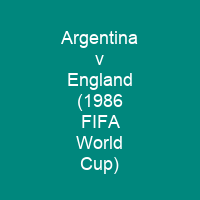Argentina v England was a football match played on 22 June 1986. It was the quarter-finals of the 1986 FIFA World Cup at the Estadio Azteca in Mexico City. The game was held four years after the Falklands War between Argentina and the United Kingdom. Argentina won the game 2–1 and went on to win the 1986 World Cup with a victory over West Germany in the final match.
About Argentina v England (1986 FIFA World Cup) in brief
 Argentina v England was a football match played on 22 June 1986. It was the quarter-finals of the 1986 FIFA World Cup at the Estadio Azteca in Mexico City. The game was held four years after the Falklands War between Argentina and the United Kingdom. The match included two of the most famous goals in football history, both scored by Argentina captain Diego Maradona. Argentina won the game 2–1 and went on to win the 1986 World Cup with a victory over West Germany in the final match. England’s goalscorer on the day, Gary Lineker, won the golden boot for being the tournament’s top scorer. The rivalry between the England and Argentina national football teams is generally traced back to the 1966 World Cup. Despite the popularity of Osvaldo Ardiles and Ricardo Villa, Argentines who played with Tottenham Hotspur in England in an era before it was commonplace for clubs to have non-British players, the rivalry remained strong. In 1982, Argentina’s forces invaded the islands, which Britain considered an invasion of its territory and sent a naval task force that recaptured the Islands on 14 June 1982. Though the two nations were never officially at war, the conflict resulted in 258 British and 655 Argentine deaths. England manager Alf Ramsey described the Argentines as ‘animals’, comments that were viewed as racist by Argentines. Argentina beat Uruguay 1–0 in the round of 16 wearing blue cotton shirts that coach Carlos Bilardo believed would prove too uncomfortable in the searing Mexico City heat.
Argentina v England was a football match played on 22 June 1986. It was the quarter-finals of the 1986 FIFA World Cup at the Estadio Azteca in Mexico City. The game was held four years after the Falklands War between Argentina and the United Kingdom. The match included two of the most famous goals in football history, both scored by Argentina captain Diego Maradona. Argentina won the game 2–1 and went on to win the 1986 World Cup with a victory over West Germany in the final match. England’s goalscorer on the day, Gary Lineker, won the golden boot for being the tournament’s top scorer. The rivalry between the England and Argentina national football teams is generally traced back to the 1966 World Cup. Despite the popularity of Osvaldo Ardiles and Ricardo Villa, Argentines who played with Tottenham Hotspur in England in an era before it was commonplace for clubs to have non-British players, the rivalry remained strong. In 1982, Argentina’s forces invaded the islands, which Britain considered an invasion of its territory and sent a naval task force that recaptured the Islands on 14 June 1982. Though the two nations were never officially at war, the conflict resulted in 258 British and 655 Argentine deaths. England manager Alf Ramsey described the Argentines as ‘animals’, comments that were viewed as racist by Argentines. Argentina beat Uruguay 1–0 in the round of 16 wearing blue cotton shirts that coach Carlos Bilardo believed would prove too uncomfortable in the searing Mexico City heat.
A designer fashioned some makeshift Argentine football shirts with silvery American football numbers on the backs to sewn on to the backs of the jerseys. The shirts were then sewn to each jersey opposite the logo of Le Coq Sportif, which provided Argentina with the numbers for the game at the time. Argentina’s side beat England 1-0 in that game to reach the final, where they beat West Germany 2-1 to claim the tournament. England won the World Cup 4-1 on penalties after a 1-1 draw with West Germany on the final day of the tournament in Brazil. The final match was played at Wembley Stadium, the home of the England national team. Argentina captain Antonio Rattin was sent off as Argentina lost in a game which contained excessive foul play. Rattin felt that the German referee Rudolf Kreitlein, who did not speak Spanish, had been biased towards the English, a fellow European nation, in front of their home fans, and stamped over the royal carpet in the stadium. After the game, Rattin said: ‘Although we had said before the game that football had nothing to do with the Malvinas war, we knew they had killed a lot of Argentine boys there, killed them like little birds. And this was revenge.’ England qualified for the finals undefeated, topping Group 3 in the UEFA zone; Argentina topped their qualifying group in CONMEBOL.
You want to know more about Argentina v England (1986 FIFA World Cup)?
This page is based on the article Argentina v England (1986 FIFA World Cup) published in Wikipedia (as of Dec. 09, 2020) and was automatically summarized using artificial intelligence.







